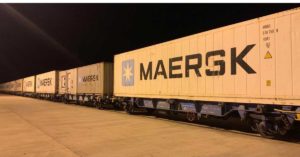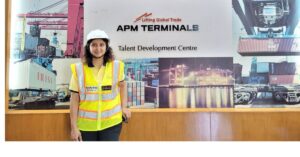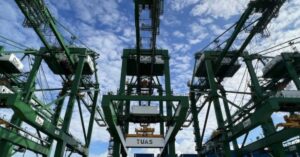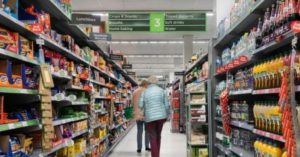“We are going to digitize our federation where we have a common platform where all India members can network and all the declarations related to Customs or shipping lines or CFSAs, they can do it from the FFFAI portal itself,” shares Shankar Shinde, Immediate Past Chairman, FFFAI
This year, India has improved its ranking on the World Bank’s Logistics Performance Index to 30th position. What do you feel has changed in the improvement in logistics and what still needs to change for the better?
We should analyse what has helped us to rise the ranks in LPI and what needs to be done to sustain and further rise up the ranking.
The government’s interest in the logistics sector is very deep, as they have dedicated one single line of ministry under the logistics division, whichisheaded by the Special Secretary Logistics under the DPIIT, serving the whole logistics industry. Earlier there was never such focal point which could really focus on what is the industry requirement. When you say backbone of the economy and there is no ministry…..earlier for matters concerning to ports, shipping; we had to go to the Minister of Ports & Shipping. If it is related to commerce, we had to go to the commerce ministry. Civil aviation was not in coordination with them. So, all these were working in isolation, and when we tried to join this whole isolated into an equal uniform practice or getting on the common platform, I think that is the biggest step the government has taken, and with this coordination, I think so it has become an easier way. I will just give you a simple example. Like Minister of Commerce under DPIIT, they have initiated e-log. Any association or person, having a grievance with regard to development can come up with a suggestion and if there is anyrepresentation to be done to the respective Minister also he may upload it on this, and it is being monitored on regular basis and then we are having a regular meeting with all these ministries on one common platform where we try to assess these developments. So, it may be related to policy, infrastructure, procedural, law, acts….everything comes into the whole system. So, this is how the initiations are started.
So, when you see the infrastructure part, the infrastructure part, everywhere you see dedicated freight corridors coming up, ports and shipping development coming up and not limiting to the ports and development, maybe the international territories like presently the Sittwe Port development where it gives accessibility to the North East also or even the eastern coast. So, all such type of infrastructure is adding value to the whole of system and this is where we find that in whole of the system, each and every sectorial…because if you see overall, the ranking is not by itself in the logistics infrastructure development. The whole system gets developed on some criteria and what are those criteria if you see? One is the customs; policies’ level, procedural aspects. Another is the infrastructure; international shipments…how much you are scoring. The logistics have quality what they are tracking; tracking and tracing. Another last one is the timelines. So, all these criteria have been fulfilled, but if you see what I was really surprised. I thought the Customs was the toppest to facilitate because every day you find something or the other trade facilitation notice coming up, but it was really surprising that Customs has now gone from 42 to 47 ranking in the whole of this criteria. When I was on the IFCBA as the Chairman of the International Federation of Customs Brokers Association, I saw they were trying to adopt India’s technology and the procedure in trade facilitation effectively. We just had one Jamaica Customs BrokersAssociationwebinar along with FFFAI to adopt the best practices and they were saying that presently, they were only following Canada and the US to adopt the best practices but after hearing us, they said you are the best. Now we should try to adopt your best practices. And other parts liketracking and tracing, it seems India is leading in digitalisation but in spite of leading on the digital platforms going down from 30 to 41 was not acceptable. If you see the infrastructure, FDI, sectoral development, is really going great. Next thing what you could see, is an integration of all systems working in isolation. Sea and land Customs transshipment, transits, these policies and procedural aspects needs to be checked because this is creating more challenges. In other countries what you find this has become seamless but in India it still needs to be addressed to enable seamless, borderless movement of cargo within the states. Even in ease of doing business, we have moved up from 14 to 6.
Government’s focus is also on reducing the logistics cost drastically and improve the first mile, last mile connectivity. Actually, that will bring the seamless movement of cargo. So, when you are moving the cargo do you see any improvement in this connectivity aspect?
Actually, the whole system, when you say the logistics cost itself is challenging on basis of how it is arrived at. We should first understand what is logistics cost? Considering the carrying capacity, whether carrying cost is involved into it, the lead time, the advance orders are involved into it, or whether you are taking only the shipments cost and not in destination,the legal policy or the legal aspect plays a very important role. I will just give you a simple example. Anything which comes under the CIF in India, the destination costs are not controllable at all. If you see the present Gazette of Sri Lanka, they have very well prescribed the amount of charges which can be levied by any of the logistics player before handing over the cargo, and it should be cost free. Like you get a courier delivered at home. It should be the same thing. It is a free exchange delivery. If this concept is implemented in India, I think we can have seamlessand faster movement and anything reducing the dwell timeor expediting the shipments movement can always be beneficial and give an add on advantage to the logistics cost.
Further, the planning and regulations; these are more important. So, logistics cost is not only the shipment cost what is incurred in direct form but is an indirect cost which has to be taken into consideration. Infrastructure can only facilitate trade but the mind set and the quality of services need introspection. For instance, I should be knowing the cost in advance when my cargo is landing somewhere, which is not transparent in the whole system, and when I am taking into consideration logistics costs, what are the parameters actually that come into this…so this clarity is still not there.
Coming to what has improved? Infrastructure, movement of goods, the carrying capacity and also the education and training have improved. In our logistics industry, it is the next generation which is coming up. The tradition set of mindset of thinking is gone. Mostly system oriented, technology oriented and more of skill development have come, skill based services and logistics are coming up. That is changing the whole focus of logistics.
You have been Chairman of FFFAI almost for 2 years now and your association with the organisation spans almost two decade. Can you briefly give me what are the achievements that FFFAI has done in the last 2 years and what were your experiences?
FFFAI has played very important role in international north south transport corridors and one of those initiatives in partnership of government which we initiated with the ministry of commerce has really made a lot of difference and has opened up the access to CIS countries like Russia and that has been a challenging road because on the other side we have China and Pakistan, which is challenging in crossing countries. So, our trade movement to this was really restricted and this has opened up new avenues for our trade and that is where we find the role of FFFAI playing very important with government’s partnership.
India was in accession to theTIR Convention. Now, no other country in isolation got the TIR Convention. India in just 88 days got this TR Convention and that was our recommendationwhenwe did INSTC. So, this has opened up a borderless Customs for entering into these CIS countries. Now coming back to the FFFAI, we have skill building initiatives engaging with the Ministry of Commerce for various projects to be undertaken. Our Indian Institute of Freight Forwarders (IIFF) is collaborating with IIFT which is the Indian Institute of Foreign Trade or NITIE, now known as IIM. In terms of the Bill of Ladings, our membership with FIATA, and International Federation of Custom Brokers Association, gives us the international perspective.
As an IFCBA International Federation,we have direct access to the WCO under the PSCG (Private Sector Consultative Group), so we also directly act as a private consultant to the WCO. So, this is how we try to develop and now we are going to digitize our federation for our members where we have a common platform with networking and all India members can network within themselves and all the declarations related to Customs or shipping lines or CFSAs, they can do it from the FFFAI portal itself.
Recently you have introduced this FIATA eFBL program. So, how is it taking shape and what is the response?
We are only able to issue bill of lading with the multimodal transport operators having registered with DG Shipping and then there is some apprehension about the players like I have to go to the government, file details. There we find that there is no participation. The FIATA bill of lading which is our international body, ICCA approved and widely acceptable in the trade, Indian Chamber of Commerce, and also by the banks. So, we experimented by introducing this bill of lading into our Indian system and empowering our logistics players and it is really doing a wonderful job. Month-on-month we are getting demands for this bill of lading. So, now we are going to take it further in getting it under the e-bill of lading platform. Now, this e-bill of lading platform also, we are ready from our side, but it is to be legalised through the banking channels because unless they do not come under the platform, to have the seamless, paperless, contactless process of the bill of lading, it is going to be difficult.
What are the key challenges your members face while executing their business? When it comes to regulatory, the international regulatory environment, nowadays it is becoming such challenging. A simple thing like SCOMET which has come up. SCOMET is one where you cannot predict or you do not know as to how to go about it. It creates a liability, accountability, and without anything you may have a business risk at stake. There are items such it is not only related to chemical or something of the engineering but it is beyond that. Anything which can be used in the source of nuclear would come under this SCOMET NOC. But where is the system which has been created to give this NOCs…like one PGI agency is there. If you are doing something with food safety, you have PGI agency like FSI, where you have drug control. Medicines and all will come under drug control, phytocentric we have an agency. But there is no such agency which has been created for this SCOMET NOC and there is no such application, and even in offices or regulatory system, even they do not have that expertise to identify whether it would be SCOMET item or non-SCOMET item…forget about the trade. Trade is still far beyond that to understand. So, such type of new regulations gives a little apprehension about handling shipments, taking shipments, which results in delayed shipments and taking up the liabilities. So, the government should be sensitising on adopting new regulations, and it should be system based, not human based. The mindset, the training at ground level needs to be changed. If I have to submit one custom declaration, I should be able to know, by when I will get the document pass with me. So, this trade transparency, if it comes, it will clearly help trade to enhance and plan it in the better way because then you don’t lose on the unproductive cost which can be like employment of vehicles for delivery and then you feel, okay the documents are not passed now. You know, in anticipation, you can do a lot of planning.












